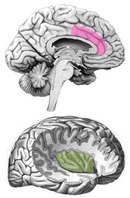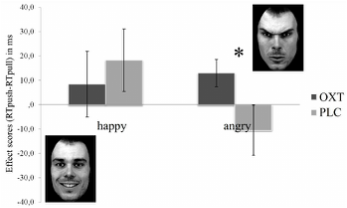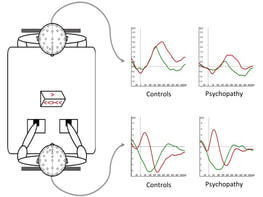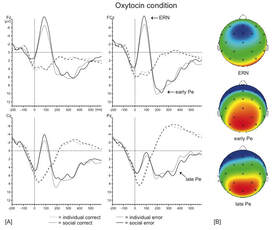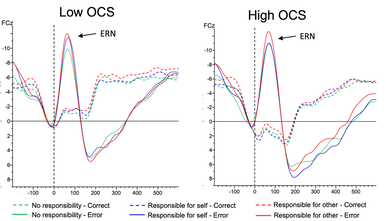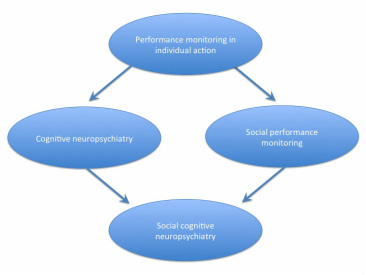
Mistakes that matter: a social neuropsychiatric perspective on performance monitoring
Efficient flexible behavior requires continuous monitoring of performance for possible deviations from the intended goal of an action.
In our lab, we study the cognitive and neural mechanisms of performance-monitoring processes necessary to interact successfully with the environment and with other humans.
Our research can broadly be divided into four topics (see figure to the right). The question how humans are able to detect errors they make, learn from these errors, and adjust their behavior in such a way that similar mistakes are prevented in the future, is addressed in the research topic on performance monitoring and adaptive behavior in individual action. Indeed, the ability to detect errors in a fast manner, ensures safe and flexible performance in humans. However, this flexibility in behavior is often disturbed in different psychiatric disorders or after the administration of drugs or pharmacological compounds. The topic of cognitive neuropsychiatry focuses on these alterations in performance monitoring.
Efficient flexible behavior requires continuous monitoring of performance for possible deviations from the intended goal of an action.
In our lab, we study the cognitive and neural mechanisms of performance-monitoring processes necessary to interact successfully with the environment and with other humans.
Our research can broadly be divided into four topics (see figure to the right). The question how humans are able to detect errors they make, learn from these errors, and adjust their behavior in such a way that similar mistakes are prevented in the future, is addressed in the research topic on performance monitoring and adaptive behavior in individual action. Indeed, the ability to detect errors in a fast manner, ensures safe and flexible performance in humans. However, this flexibility in behavior is often disturbed in different psychiatric disorders or after the administration of drugs or pharmacological compounds. The topic of cognitive neuropsychiatry focuses on these alterations in performance monitoring.

Importantly, effective social interactions not only rely on continuous monitoring of own performance, but also require monitoring of the actions of the person one is interacting with. Moreover, one needs to adequately and flexibly adjust one's own actions in response to detected errors made by oneself and the other. The topic of social performance monitoring investigates all aspects of performance monitoring and adaptive behavior in social contexts.
When errors are rewarding: Posterior medial frontal cortex (including anterior cingulate and pre-supplementary motor area) and bilateral insula are similarly activated for errors in a shoot-'em-up game independent of the outcome or agency. In other words, the cingulate-insula network doesn't care about who makes the error or the reward associated with the error and is thus even activated when observing errors made by your opponent. De Bruijn et al., J Neurosci, 2009 |
More recently, and with the help of grants from the Netherlands Organization for Scientific Research (NWO; VENI and VIDI), my research has extended into the interesting and emerging domain of social cognitive neuropsychiatry, in which we investigate disturbances in various aspects of social adaptive behavior in different psychiatric disorders. To provide an integrated view of the different processes, we make use of various approaches and methods, such as behavioral experiments, EEG, and fMRI techniques, as well as psychopharmacological manipulations (e.g., administration of the hormone oxytocin).
Besides the investigation of performance-monitoring processes, we also study other relevant processes that enable social action control, e.g., approach-avoidance behavior, self-other integration, social conformity, and social decision-making. Finally, we examine possible disturbances of these processes in different psychiatric disorders with evident social dysfunctions, such as psychopathy, social anxiety, depression, and schizophrenia.
Although erring is human, the distress associated with making mistakes is something we prefer to avoid. Errors made in a social context are even more distressing as they may have consequences for other people and are thus associated with increased feelings of responsibility, guilt, and shame. We investigate how these so-called harmful mistakes are processed in the brain.
Oxytocin-induced enhancements of social mistakes: Healthy male volunteers show increased electrophysiological responses to own errors that also have negative consequences for a co-actor after administration of the nonapeptide oxytocin. de Bruijn et al., Social Cognitive and Affective Neuroscience, 2017 |
For an overview of previous and current projects, see the Projects and People section. For output, go to the Publications section.
Our research has been supported by grants from the following agencies:
